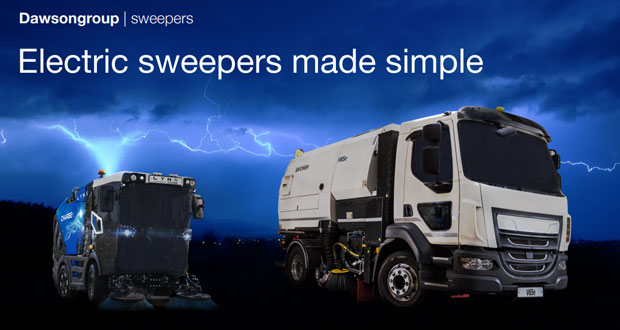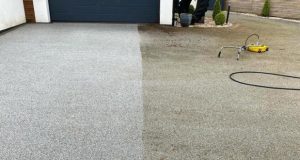As commercial vehicle fleets move towards a more sustainable future, Paul Beddows, Head of Sales at Dawsongroup sweepers, explains why the municipal sector must also follow suit and go green.
Electric vehicles (EVs) have boomed in the past few years, and they are becoming increasingly accessible to all. From public transport to private vehicles and commercial fleets, the uptake of alternative fuels is rapidly increasing.
In fact, just last summer, seven of Britain’s major companies – BP, BT, Direct Line Group, Royal Mail, ScottishPower, Severn Trent and Tesco – came together to help accelerate the mass adoption of electric vehicles across the UK.
Forming the Electric Vehicle Fleet Accelerator (EVFA), these seven companies committed to converting their fleets to electric vehicles by 2030, if both industry and government future proof the electricity network and invest in grid capabilities and EV charging infrastructure.
This marks a clear statement of intent from some of the UK’s most successful businesses that fuel diversification is a must as we move towards our Net Zero ambitions.
Local authorities too are under increasing pressure to go green. From encouraging their citizens to adopt alternative fuels, to leading by example and investing in an electric fleet, there is a major need to reduce emissions on our roads.
Importance of municipal fleets
Street sweeping plays an important role in keeping our towns and cities safe and clean and road sweepers are a vital piece of equipment for a local authority’s municipal fleet. From removing dangerous materials – such as glass or metal – from pavements and roads, to keeping gutters clear and reducing the risk of flooding, street sweeping is an essential task within society.
Many private businesses also include road sweepers within their commercial fleet for the very same reasons. From private car park owners to construction site managers, there is increasing demand for these services across the board to keep service roads and access lanes clear and safe.
With an estimated 1,110 to 2,100 tonnes of debris per street acre removed each year, road sweepers cover a lot of ground, on a very regular basis.
Going green
We all know that fuels such as petrol and diesel contribute significantly to global warming. In fact, transport remains the largest emitting sector, responsible for 27 per cent of all greenhouse gas emissions in the UK*.
The pressure of adhering to stringent legislation regarding emissions, especially in Low Emission Zones (LEZ), will only continue to intensify as we near our Net Zero deadline in 2030.
Add to this the news that from April 1st, red diesel will no longer be legal to use in the construction industry, there has never been a better time to make the switch.
As a nation we are being urged to change our ways and plug into a more sustainable way of fuelling our transport. And this absolutely has to extend to municipal and specialist vehicles, like road sweepers.
Several councils have outlined their own green visions, centred around reducing carbon emissions. The replacement of council fleets with more fuel-efficient alternatives will play a major role in achieving these ambitions.
Alongside a switch to electric cars and vans, local authorities should consider upgrading their municipal fleet.
The benefits of going electric are plenty. An investment in electric road sweepers will not only cut emissions, but it will save councils significant amounts of money on fuel each year, when compared with a diesel or petrol alternative. Electric sweepers also considerably cut noise pollution levels.
At Dawsongroup sweepers, we are constantly looking ahead to the innovations that will lead our industry. Demand for electric vehicles has boomed in the past few years and as the fleet world takes positive steps towards reducing its impact on the planet, we want to lead this change by investing in green technology.
We have kick-started the year with a multi-million-pound investment into alternative fuels. Our range of zero emission electric road sweepers will be available to hire this year, and our fleet includes the Lynx Charge compact sweeper and the Bucher MaxPowa V65e truck mounted sweeper.
The Lynx Charge features 2m3 container capacity and unparalleled power. Built on the same platform as the diesel-powered Lynx, the Charge uses a custom-designed battery pack and innovative systems to utilise the available energy.
The Bucher MaxPowa V65e is a 100 per cent electric sweeper, offering a solution for zero emissions sweeping combined with longer on-station time, ease of use and low operational costs.
Both vehicles boast significant green credentials, without compromising on a first-class performance.
The future is green
This investment in electric vehicles marks the start of our green fleet, which we are set to expand in the coming months.
* https://www.racfoundation.org/motoring-faqs/environment#a1





